The author thanks Jorge Hernandez Hernandez for his assistance in the research for this article.
But this seemingly peaceful environment is deceptive. Since a mine began operating nearby, residents passing in the road view each other with suspicion. The fear is palpable in Vasquez’s home as well. And one evening last March her fears became real. She remembers waiting at home for her brother Bernardo to return from the Oaxaca city airport:
He called us at six that evening. I asked him to wait for us in the airport, because there were people looking for him. The day before a stranger had been asking for him, and that night a woman came asking to make a phone call. We didn’t realize what was about to happen, that she was just finding out the time he’d be leaving Oaxaca.
At all the crossroads on the highway there were people watching to see when he’d pass by. After stopping at a gas station he saw there was a car following him. Then there was another car beside him. He thought it might be one of the taxi drivers from our town, but it wasn’t. When the car pulled along side him they began to fire. The shots hit him in the back, and they forced him off the road at the crossroads to Santa Lucia, where he fell over the wheel. My cousin was sitting beside him, and was shot in the leg.Avigahil Vasquez
Jaime Vásquez Valencia, a passing taxi driver, stopped to help. He put Vasquez and his wounded brother and cousin into his taxi and drove them to the closest town. By the time they arrived, however, Bernardo Vasquez was already dead. Paramedics took his two wounded companions to the Specialties Hospital in San Bartolo Coyotepec.
The assassination was planned. We knew he was bothering the mine, because he was getting a lot of threats. He was very quiet about it, but he told me, “I know I’m going to die, because the mine doesn’t like what I’m doing.'” Most threats came on the phone. They’d say, “You know, Bernardo, you’re going to die.'” There was a threat written on the wall of the spillway below the dam, saying “Your end has come.” Leaflets would appear in town, saying, “The end of Bernardo Vasquez has come.” When we’d tell him to be careful he’d say, “I have to stay here. If my death is coming, I accept it.” He came to help people wake up, and because of his bravery, many people followed him.Avigahil Vasquez.
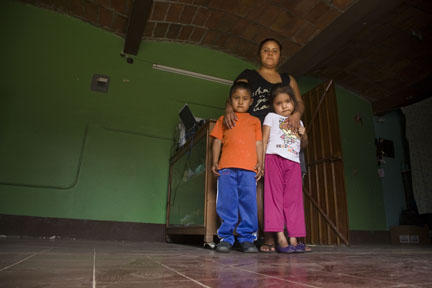 Avigahil Vasquez Sanchez, the sister of Bernardo Vasquez, assassinated in March, in her home and office of the resistance.
Avigahil Vasquez Sanchez, the sister of Bernardo Vasquez, assassinated in March, in her home and office of the resistance.
The civil war inside San Jose del Progreso began when Fortuna Silver, a company directed by Peruvian mining engineers and backed by Canadian investors, decided to open a modern mine in an area where small-scale prospecting had taken place for many years. What the company and its Mexican subsidiary, Compañía Minera Cuzcatlan S.A. de C.V., envisioned was far from a small operation, however. In 2006 the Federal government granted the company a concession covering 223 square miles of land. On its website, the company refers to this area as “brownfields.” Today it excavates and crushes 1,500 tons of rock per day, extracting silver and gold in chemical leaching processes.
San Jose’s residents are Zapotec farmers who speak an indigenous language that is centuries old. The farming community constitutes an ejido, an association formed by Mexico’s land reform laws. The mining project drove a deep wedge between town residents at a time when many communities in Oaxaca were already divided between different political parties.
The town’s political authorities are supporters of the Institutional Revolutionary Party (PRI). The party governed Oaxaca for seventy years. Its last governor, Ulises Ruiz, put down an uprising that grew out of a teachers strike in 2006 with massive violence. When town residents began questioning the mining project, the municipal president Venancio Oscar Martínez Rivera referred to them scornfully as “APPO sympathizers,” referring to the organization that fought the governor in the streets of Oaxaca city.
Christina Pagano, a Fortuna Silver spokesperson, says “The company gained authorization to use land from the San Jose del Progreso Ejido via two public assemblies held by the Ejido members in 2006 and 2007.” But Avigahil Vasquez says it took a while for the town to wake up to what was being planned.
In town meetings the previous municipal president, Amadeo Alejo Vasquez Rosario never told people what he was doing. He just said he was giving permission for a garbage dump. We finally realized the dump was actually a mine concession. By that time some people had already agreed to sell their ejido land.Avigahil Vasquez.
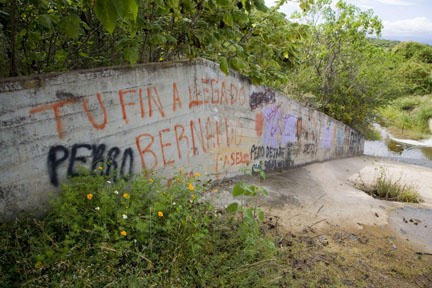 On a wall by a dam spillway, a threat was spray painted before the assassination: “Bernardo Vasquez, Your Time Has Come – Dog!”
On a wall by a dam spillway, a threat was spray painted before the assassination: “Bernardo Vasquez, Your Time Has Come – Dog!”
Her brother Bernardo, who had been working in Petaluma, California, heard about the growing dispute, and returned to San Jose to help fight against the mine. The mine opponents organized the Coordination of the United Towns of the Ocotlán Valley (CPUVO). On March 14, 2009, they blocked the road going into the mine concession, demanding that the government cancel the concession because it would pollute the environment with cyanide, mercury, and heavy metals.
Avigahil Vasquez recalls a meeting of the ejido members on April 5, during the blockade.
The ejido members were called to the meeting by Quintin Vasquez Rosario, the land commissioner. When they got there the doors were closed, and they were told to sign blank sheets of paper. When the ejidatarios began to protest, they just told them to sign. At the door they collected the sheets with the signatures and inspected their membership documents.
People believed the authorities had already come up with an agreement, giving away their rights to the mine. When they demanded an explanation, the municipal president pulled out his gun. People began running towards the school, and he began to fire. Fortunately, he didn’t hit anyone, but some were beaten by family members of the commissioner and the municipal president. In the end, the commissioner had to give up his position, but later we found he was still signing agreements.Avigahil Vasquez
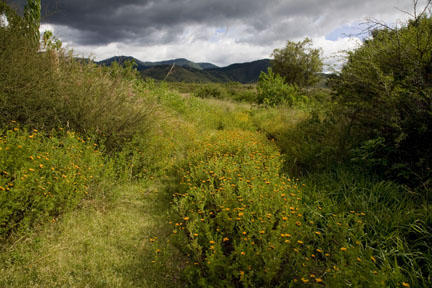 Part of the ejido of San Jose del Progreso, near the dam and reservoir.
Part of the ejido of San Jose del Progreso, near the dam and reservoir.
Fortuna Silver was able to begin mining in San Jose because of changes in Mexico’s economic development policy that date back to the 1980s, when its government began welcoming foreign investment in resource extraction, even at the cost of environmental destruction and the repression of popular movements. It is a shared policy to which Mexico’s old ruling party, the PRI, and its governing party of the last 12 years, the National Action Party (PAN), have an equal commitment.
In 1992 PRI President Carlos Salinas de Gortari modified the country’s mining law. The new mining law said any potential resource must be utilized, giving mineral extraction preference over any other use. A year later, just before the North American Free Trade Agreement took effect, the ceiling on the amount of foreign investment that could be allowed in “strategic” industries (like mining) was eliminated. Salinas’s successors, both the PRI’s Ernesto Zedillo and the PAN’s Vicente Fox, increased the number of mining concessions while eliminating taxes on mining operations.
According to La Jornada columnist Carlos Fernandez-Vega, land given in concessions reached 25 million hectares by the end of Fox’ term in 2006, and more than doubled, to 51 million in the first four years of his successor Felipe Calderon’s administration. In return for four million hectares of those concessions, the Mexican government received just $20 million.
“Concession holders can demand that land occupied by a town be vacated, so that they can carry out their activities,” write Mexican academics Francisco López Bárcenas and Mayra Montserrat Eslava Galicia in a study called “Minerals or Life.” “If land is used for growing food, that has to end so that a mine can be developed. Forests or wilderness are at the same risk.” Mines can take land used by indigenous people, like San Jose’s residents, in violation of International Labor Convention (ILO) 169 protecting indigenous rights. Municipalities can’t even charge fees to compensate for the use or destruction of their resources.
This economic model could have changed in Mexico’s national elections last July, had a party won that was committed to protecting social rights, even at the cost of foreign investment. Instead, the Mexican election campaigns of the two conservative parties were fueled by enormous corporate contributions, and in the end, the PRI was returned to power. The economic development policy it has shared with its PAN rival will not change, and because mining and economic development are governed by Federal laws and policies, conflicts in rural communities like San Jose del Progreso will become even more widespread.
The PRI history of suppressing dissent became clear in May of 2009, when Governor Ulises Ruiz ordered state police to end the blockade of the Fortuna Silver mine, using dogs, guns, tear gas, and a helicopter. Bernardo Vasquez and 18 others were arrested.
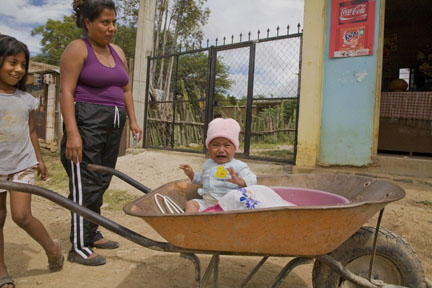 A woman and her daughter carry her infant in a wheelbarrow.
A woman and her daughter carry her infant in a wheelbarrow.
By then the election campaign for the state’s governor was heating up. Gabino Cue, the former mayor of Oaxaca city, was running against the PRI. San Jose’s mine opponents supported him. On June 18, a group returning from an election rally found the municipal president, Oscar Venancio Martínez Rivera, loading gravel from the ejido into dump trucks, presumably selling it for highway construction. A fight broke out, in which Martinez and health director Félix Misael Hernández were shot and killed.
Bernardo Vasquez was arrested, along with eight others. PRI supporters kidnapped, beat, and tortured a local priest and mine opponent, Martín Octavio García Ortiz, before handing him over to police. Eventually Garcia was forced to leave San Jose. The priest said his attackers belonged to an organization formed to support the mine, “San José, Defendiendo Nuestros Derechos” (San Jose, Defending Our Rights). Four days after that, Compañía Minera Cuzcatlán announced it had gained seven additional concessions totaling 34,010 hectares, some lasting fifty years.
On July 1, 2010, Gabino Cue was elected governor, defeating the PRI. Vasquez was freed in September, when the prosecutor announced there was no evidence against him. He then called for municipal elections in San Jose, saying, “We’ve passed through the stage of confrontation, and now we should build a bridge for reconciliation.” In December, however, the PRI candidate Alberto Mauro Sánchez defeated him 1,359 votes to 1,216.
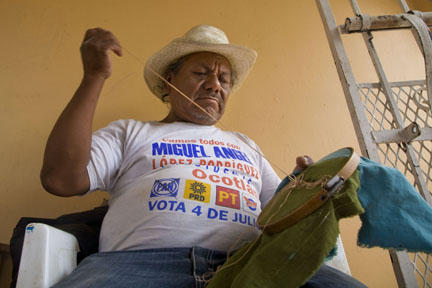 A resident embroiders cloth, a traditional form of artesania in San Jose, and wears a shirt supporting the candidate of the slat
A resident embroiders cloth, a traditional form of artesania in San Jose, and wears a shirt supporting the candidate of the slat
The following year, 2010, the mine began construction, spending $55 million (USD). In 2011 its first year of production yielded 490,555 ounces of silver and 4,622 ounces of gold, at a cost per silver ounce of $4.51. At the market price for silver today, about $30.85 per ounce (and gold $1660.00 per ounce), the first year’s silver production was worth $15.13 million. According to Fortuna’s website, “In 2012, San Jose is expected to produce 1.7 million ounces of silver and 15,000 ounces of gold.”
The website says Fortuna sponsors projects including a health post, sports court and daycare center, school scholarships, and “upgrades to kitchens and construction of ecological bathrooms.” Bernardo Vasquez told Canadian journalist Dawn Paley, however, “they only gave them out to buy people off, but also, they never worked, so the people are still cooking in the traditional way … it’s like a package that they apply in every country and they think that people in every country are going to respond the same way.”
In May 2011 representatives of ten towns asked the government again to cancel the concessions, saying they were discharging cyanide and mercury. “These mining projects don’t represent development,” Vasquez charged, “and instead have cause serious damage to the environment and our social fabric.” Conflict grew so intense that the official taxi drivers with permits, who are allied with the PRI, refused to pick up passengers belonging to CPUVO. When the mine opponents organized their own taxi collective, the state refused to give them permits. The police came to stop the new taxis from operating and in the ensuing melee two police cars and two taxis were destroyed. Today in the center of San Jose del Progreso the official red-and-whites line up in front of the church, while by the market the unofficial drivers park their tiny blue three-wheelers.
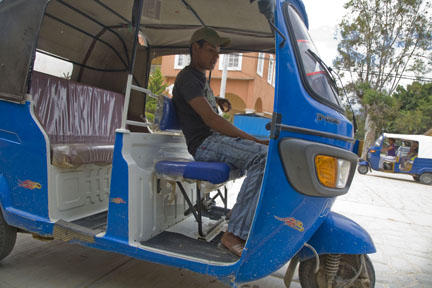 The blue taxis belong to drivers who oppose the mine. When they pick up customers the government calls them “pirates.”
The blue taxis belong to drivers who oppose the mine. When they pick up customers the government calls them “pirates.”
Finally, on January 18, 2012, violence became terror. Mine opponents charge the municipal president, Alberto Mauro, with laying a pipe from the dam and reservoir holding the water for drinking and irrigation, diverting it to the mine. Fortuna denies this and says its water comes from rain collection and water reclamation from a sewage treatment plant in the neighboring city of Ocotlan.
I was working in the house when I heard someone calling us to go to the church to support our compañeros. We were worried that if they let the pipe pass through, it would leave us all without any water. We were worried also that they would even send armed men or killers. When we got there Alberto Mauro’s brother said he wanted to talk with Bernardo [Vasquez] and Rosalinda, who weren’t there. These men had pulled their guns when a woman shouted not to shoot because Bernardo was coming. But that Bernardo was Bernardo Mendez, not Bernardo Vasquez. He lives in a little alley, and that’s where they got him. They never even gave him the chance to walk into the street. They put eight bullets into him.
The person who shot him, Albindo, is not from our town. But once he began firing, all the rest of them did tooone of the council members, Mauro’s brothers, the sons of the town trustee, even the town police chief at the timea boy who was only 18. I was hit by a bullet fired by a woman who lives here in town. The bullet is still in my right leg, near the knee. The doctor doesn’t want to take it out because he says if he does I’ll lose my whole leg.
We were not armed. We didn’t have anything. We took Bernardo Mendez to the Specialties Hospital, but they wouldn’t admit him until they my brother talked to the government secretary. But Bernardo Mendez only lasted two days, and then he died.Avigahil Vasquez
Bernardo Vasquez demanded that the local government be dissolved and that Alberto Mauro Sanchez be removed as municipal president, saying “he ordered the municipal police to fire on the people.” A few days later, the state prosecutor charged Gabriel Martinez Vasquez with homicide. Albindo Gómez Rodríguez wasn’t arrested until April, a month after Bernardo Vasquez himself was assassinated as he drove home from a trip to Mexico City to appeal for international support.
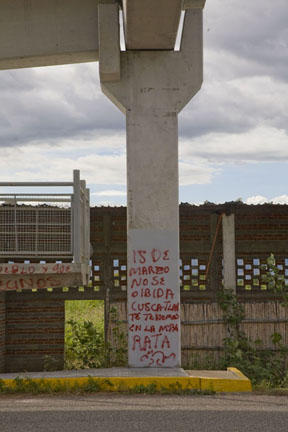
On a bridge over the highway by the town, where Bernardo Vasquz was assassinated, someone has spraypainted “The 15th of March Will Not be Forgotten”the date of Vasquez’ s murderand “Cuscatlan [the name of the mining company] We Know What a Rat You are”with a drawing of a rat. Another slogan painted nearby says “Fuera Mina!” or “Mine Get Out!”
CPOVU representatives Jorge Sanchez and Eustasio Vasquez said Vasquez’s killing was the work of “guardias blancas,” or paramilitaries, supported by the company. “We’ve seen them give money to people in the community who are against us, a group called ‘Defending Our Rights.’ These are people who now have new cars, when before they had nothing.” Fortuna’s CEO Jorge Ganoza told Canadian media, “We, as a company, and our team in Oaxaca, are saddened by these senseless and continued acts of violence in the town of San José, related to a long-standing political struggle for local power. It is in no way related to our activities or involves company personnel.”
Pagano, Fortuna’s public relations spokesperson, adds, “The company has been supporting various development initiatives brought forward by the ‘Asociación Civil San José Protegiendo Nuestros Derechos’ [Civic Association San Jose Defending our Rights]. This community group is composed of a wide array of community members that have come together to organize various development projects.” She says Fortuna Silver doesn’t supply the group with direct funding, only materials and technical assistance.
But she also adds that “The company signs annual agreements with the municipality of San José del Progreso to fund various infrastructure projects which are presented for approval to the community in an open popular assembly every year.” Regardless of how open the assembly is to mine opponents, the municipality itself is controlled by Alberto Mauro Sánchez and the PRI hierarchy.
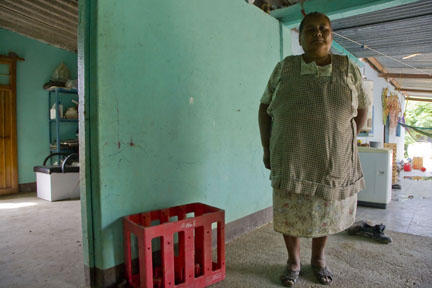 Rufina Sanchez, Bernardo Vasquez’ mother, in the office of the resistance movement and the home she shares with Vasquez.
Rufina Sanchez, Bernardo Vasquez’ mother, in the office of the resistance movement and the home she shares with Vasquez.
Following Bernardo Vasquez’s murder, an article in a Oaxaca daily charged that he had signed an agreement in February, alleging he had received 16 million pesos for employment, education, and health projects. Also signing allegedly was Alberto Mauro Sanchez Muñoz. Avigahil Vasquez called the report disinformation. “Eight days after his murder, they were saying he’d been killed by his own people, because he’d sold them out to the mine for 20 million dollars. It was ridiculous. It’s not true he was killed just because of a fight inside the town. We were living a normal life before the mine came.”
The violence didn’t stop, however. CPUVO leader Leovigildo Vásquez Sánchez says armed police and mine guards drive through San Jose’s streets at night to intimidate inhabitants. The company, he charges “are the ones who are bankrolling this, those who supply the money that buys the pickup trucks and the guns that normally only the army has.”
After a short blockade of the mine entrance again in May, on the evening of July 16 two mine opponents, Guadalupe Vásquez Ruiz and Bertín Vásquez Ruiz, were shot by gunmen outside the Catholic Church. Guadalupe Vásquez Ruiz was wounded in her leg, and Bertín Vásquez Ruiz was shot in the stomach. They were taken to the hospital in Oaxaca, where Bertin Vasquez Ruiz remained on life support for weeks. They named as one of their attackers an assistant to the public works director, Aarón Pérez Vásquez. A subsequent press release issued by the Oaxacan Collective in Defense of the Land, and officials of the town of Capulalpam de Mendez [which is also resisting a mine] named two additional people responsible for the shooting, an alleged mine employee and another associate of the municipal president. Finally in October, two people were arrested for killing Bernardo Vasquez.
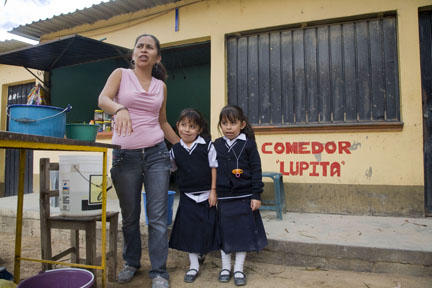 A woman and her daughters in their school uniforms, by the stall where she sells food in the town marketplace.
A woman and her daughters in their school uniforms, by the stall where she sells food in the town marketplace.
Yet Avigahil Vasquez doesn’t believe that even if the mine ended production, the divisions would be easily healed: The first thing that has to happen here is that the mine must leave. But that alone won’t resolve things, because the people who defend it want it to stay, and we want it to go. We all live side by side. Next door to someone who wants the mine lives someone who’s the mine’s enemy. The whole town is divided by this. The primary school’s parents group hasn’t been able to meet. The parents have assessed a fee to keep the school running year around, but this year the parents on the other side filed a suit to stop charging the fee. The school has been able to keep going, but you can see the conflicts even among the children now. They look at each other as enemies depending on which side their parents are on. They attack each other with words, but they begin to talk about guns and pistols. We’re living with this conflict inside all our institutions. Bullets and shots every day, every hour of the day.

















